Index • FIDE 1948-1990 • Pre-FIDE • Highlights • Best games • News/Feedback • Gifts • Site map
World Chess Championship
|
||
After a long search for an acceptable venue, the 20 game match was played in Elista, the capital of Kalmykia. At the time of the match, Karpov was 45 years old and was playing in his ninth match for the world chess crown. Kamsky was 22 and playing his first match for the title.
Kalmykia
The Kalmyk Republic is situated between the Black and Caspian Seas. It was created as an autonomous zone in 1920 by Soviet authorities, and became self-governing in 1935. It is a sovereign state in the Russian Federation.
The country has approximately 300.000 inhabitants, half Russian, half Kalmyk. A quarter of the citizens live in the capital. The Kalmyks, who are related to the Mongols, are predominantly Buddhist and are proud to claim that their nation is the only Buddhist state on European soil.
During the second world war, the Kalmyks sided with Germany. Afterwards, Stalin had the entire population deported to Siberia. The Kalmyks were allowed to return to their country after Stalin's death.
That the match took place at all was largely the work of Kirsan Ilyumzhinov, FIDE President and President of the Kalmyk Republic. He had been elected President of Kalmykia in 1993 and re-elected in 1995, the same year he was elected FIDE President. At the time of the match, he was 34 years old.
The match fit well with Ilyumzhinov's plans to turn Kalmykia into an international chess center. He made chess a required subject in the schools and had plans to construct a center for the Chess Olympiads.
The match
Kamsky, who had emigrated from Russia in 1989, was concerned about his personal safety on Russian territory. He agreed to play when Ilyumzhinov personally guaranteed the security of Kamsky's entire team.
Kamsky's seconds were Predrag Nikolic of Bosnia, Loek Van Wely of the Netherlands, and John Fedorowicz of the United States. Kamsky's father Rustam served as the chief of his delegation. It was rumored that he also selected his son's openings for each game.
Karpov's seconds were Vladimir Epishin of Russia, Mikhail Podgaets of the Ukraine, and Ron Henley of the United States.
The prize fund was 2.000.000 US$ of which 500.000 US$ would be given by the players to the children of Kalmykia. FIDE would take 1/4 of the rest. Of the remainder, the winner would get 5/8, which works out to 703.125 US$.
If tied after 20 games, the match would continue until a player won a two game mini-match. No timeouts were allowed; a player who could not play a game would lose that game by forfeit.
Geurt Gijssen served as the match arbiter. At the opening ceremony on 5 June, Karpov won the draw for color and chose White for the first game.
The two players could not agree on the terms of adjournment. Karpov wanted the games adjourned after six hours of play, while Kamsky wanted all games played to a decision on the same day. The match agreement, signed in December 1995, had stipulated 40 moves in two hours followed by 16 moves in one hour.
When the disagreement had not been resolved by the eve of the first game, Ilyumzhinov decreed that the match agreement would be respected; if Kamsky decided not to play, his prize would be given to charity.
The match began on 6 June. The first game, a Gruenfeld Defense, was adjourned after 56 moves, but Kamsky resigned before the game continued.
| Game 1 : Karpov - Kamsky |
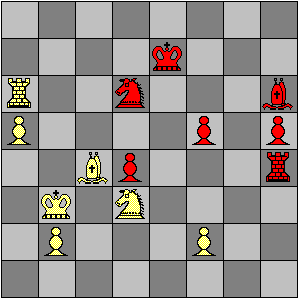
|
| after 56...Rh1-h4(xP) 1-0 |
| (Karpov sealed 57.Bc4-d5, which wins easily.) |
|
|
The match was even again after Kamsky won game 2 with active play.
| Game 2 : Kamsky - Karpov |
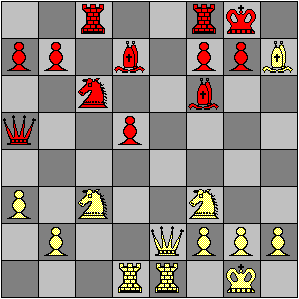
|
| after 20.Bd3-h7(xP)+ |
|
|
Game 3 was a 49 move draw. In game 4, Kamsky fell victim to Karpov's opening preparation in a Caro Kann.

|
| Game 4 : Kamsky - Karpov |
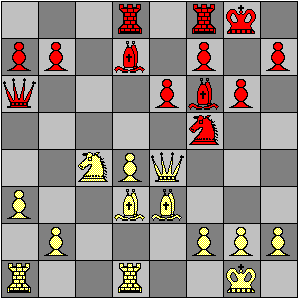
|
| after 19...Qb6-a6 |
|
|
Game 5 ended in a 22 move draw after Kamsky sacrificed an exchange. In a double-edged position, the opponents repeated moves for the draw.
| Game 5 : Karpov - Kamsky |
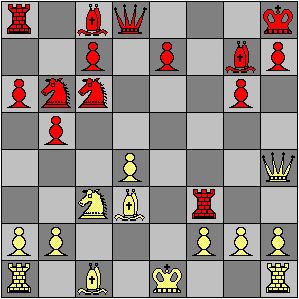
|
| after 14...Rf8-f3(xN) |
|
|
Game 6 was all Karpov's and Kamsky resigned on the 30th move.
| Game 6 : Kamsky - Karpov |
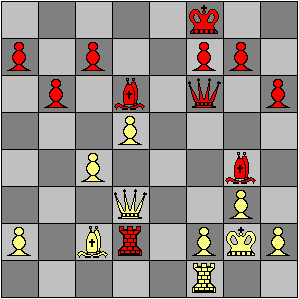
|
| after 29...Red-d2(xB) 0-1 |
|
|
In game 7 Karpov missed an easy win, but triumphed in the endgame.
| Game 7 : Karpov - Kamsky |
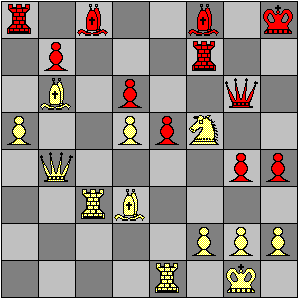
|
| after 35.Ng3-f5(xN) |
| (35.Rxc8 wins.) |
|
|
In game 8 Karpov defended well and held a difficult position. Karpov won game 9 to take an imposing lead of 6 1/2 - 2 1/2. He had scored five points in six games.
While the games were in progress, GM Evgeny Vasiukov and IM Vladimir Gagarin used a backstage computer to analyze the games for the daily bulletin. Rustam Kamsky, fearing that the analysis was being transmitted to Karpov, tried to have it stopped. He gave a press conference after game 8. The Appeals Committee decided that no wrong had been done, but banned chess playing programs from the computer room.
| Game 9 : Karpov - Kamsky |
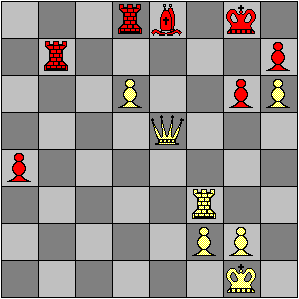
|
| after 41.Ra3-f3 1-0 |
| (threatens 42.Qh8+) |
|
|
Kamsky stopped the slide by winning game 10, after he opened up the center against Karpov's King.
| Game 10 : Kamsky - Karpov |
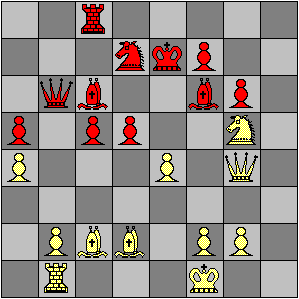
|
| after 24.e3-e4 |
|
|
Neither player was able to gain an advantage in game 11, which was drawn after 60 moves. Kamsky was in difficulties in game 12, but managed to survive an attack and hold the endgame.
| Game 12 : Kamsky - Karpov |
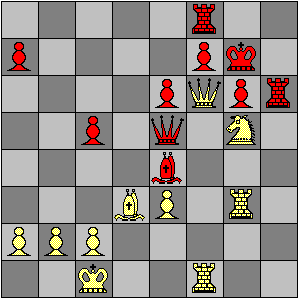
|
| after 28.Qf2-f6(xN)+ |
|
|
Karpov had the advantage in game 13, but stumbled. Kamsky had a probable win at adjournment, but let it slip. After three consecutive draws, Karpov scored again in game 14 by winning a pawn and showing his outstanding endgame technique.
| Game 14 : Kamsky - Karpov |
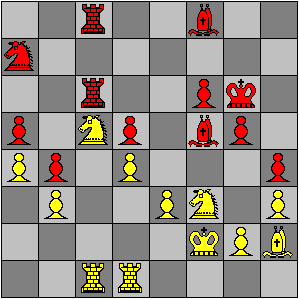
|
| after 36...a6-a5 |
|
|
Game 15 was a draw. Karpov led 9 1/2 - 5 1/2 and needed only one point in the last five games to win the match. Kamsky scored his last full point in game 16.
| Game 16 : Kamsky - Karpov |
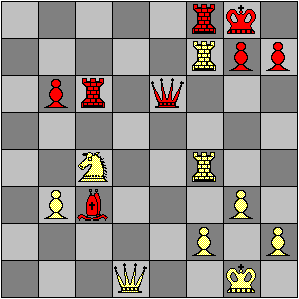
|
| after 25.Rd7-f7(xP) |
|
|
Kamsky battled in games 17 and 18, but could not reduce Karpov's lead. Karpov drew the 18th game on 11 July, thereby winning the match. It was to the credit of both players that the games were hard fought and averaged well over 50 moves.
Six months after the match, Kamsky announced his retirement from chess to pursue a career in medicine.
|
WCC Index |
Results |
|
Previous |
Next |